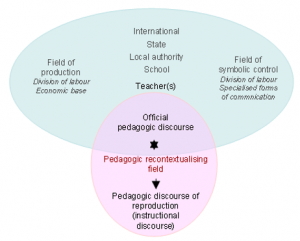Mae'r cynnwys hwn ar gael yn Saesneg yn unig.

Figure 1. Official and recontextualised fields, derived from Bernstein (1996)
Research Questions
- How are Pioneer Schools developing the new curriculum in a way which benefits all learners?
- What are Pioneer Schools doing to ensure that the implementation of the new curriculum benefits all learners, including those from disadvantaged backgrounds?
- What are teachers’ perceptions of the new curriculum, preparation and support for its full implementation and potential challenges?
- What are Pioneer Leads’ and teachers’ perspectives on the nature of knowledge in the new curriculum and the place of subject teaching?
- How might pedagogy need to change in order to for all learners to benefit from the new curriculum?
Aim
The aim of the research is to understand better how schools are developing the new curriculum and what potential impact could it have on different groups of students, particularly those from disadvantaged backgrounds.
Background
The new curriculum provides teachers with more flexibility and freedom in relation to their choice of topics and how they engage students with subject knowledge. It also advocates an interdisciplinary approach to delivery of curriculum knowledge and indicates a move away from focus on student performance in standardised tests as the key goal of educational outputs. Teachers who are well trained and inducted into modes of thought related to their respective specialised disciplines may struggle to adapt and make use of the new flexibility provided. Also, teachers’ implicit assumptions about curriculum relevance may reflect their own concerns rather than address the needs of young people, particularly those coming from disadvantaged backgrounds (Bernstein, 1996; Rata, 2015). To address these problems, Bernstein argued that children needed to experience, “increased sensitivity on the part of teachers towards both the cultural and cognitive requirements of the formal educational relationship” (1975). The research can thus be seen as exploring the interplay between official pedagogic discourse and the recontextualing of this by teachers in Pioneer schools (Figure 1). More specifically, it will explore how teachers are developing the new curriculum in a way that addresses the needs of children from disadvantaged backgrounds, while at the same time changing their ‘mindset’ concerning their identity teachers.
Method & Sample
Semi-structured interviews with Pioneer Leads and groups of teachers in schools with a high proportion of children from disadvantaged backgrounds (N=10-12).
Themes discussed in interviews include: Experience of the curriculum development process (CPD, resources), dissemination and development activities within school, the place of knowledge within the new curriculum, organisation of what will be taught, how pupils (will) experience the new curriculum.
The schools include both Primary and Secondary, Welsh and English medium and are geographically spread across Wales.
Interview data will be analysed and a survey will be created to be distributed to a larger sample of teachers.



